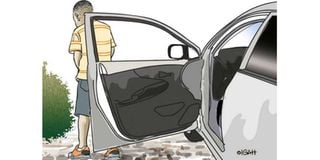Let’s stop normalising public urination

What you need to know:
- Why is it only men that seem to get pressed and urinate in public?
- Is it that girls are taught better manners from childhood than boys?
Men have normalised urinating in bushes, by the roadside, and on car tires. We’ve all had the experience of walking with someone; then he goes missing. When you notice his absence and scan around, you see him emerging from a bush, or behind a wall.
I was on a road trip with my son a few weeks ago when something happened that made me think through that culture.
He told me he wanted to pee. Usually, he would sound the alarm before it is too late, which gives me ample time to find a town centre where we can go to a proper washroom.
On this day, he had dozed off in the backseat, and when he woke up, his bowels were on the verge of bursting.
“Can you hold on a bit?” I questioned.
“Let... me... try.”
Struggling
The way he responded told me he was struggling to hold on and anyone who has been pressed knows how much urine can disorient your system. The uric acid burns you from the inside, your legs tremble, and the speech slurs as you worry that any small movement could release a fountain.
The problem was that we were in the middle of nowhere. I was still thinking about our predicament when I saw a row of roadside hawkers ahead. I slowed down and approached them.
“Kuna washroom hapa karibu? Mtoto wangu amekazwa.” (Is there a washroom around here? My son needs to pee)
“Huyu ni mtoto kijana, mpeleke hapo kwa ukuta akojoe,” (This is a boy, lead him to that wall) said one of them, motioning me to an abandoned mud hut.
The rest backed him. My eyes did a 360-degree pan around the area, and apart from the hut, all I could see were hawkers and bushes. I could tell my son was hesitant.
Just as we were still haggling, a sedan stopped a few yards away and out jumped a boy. He was flanked by a young woman, most probably his mother. She did a quick scan before directing him to the hut where he unzipped, pulled his willy out and sprayed the wall.
“You see!” the group nudged, insisting that I follow suit. I walked my boy to the hut and told him to pee.
“You are sure the owner will not find out that someone peed on his house?” he asked.
“Let’s hope it rains today and washes it away,” I replied.
With the assurance, he went ahead and relieved himself.
As I drove away, I asked myself so many questions. The first was why, as a country, we seem comfortable entrenching in our boys from a tender age that it is okay to pee in public, then start writing “Usikojoe Hapa” for them when they grow up with the deeply-engrained habit.
That mother who had directed her son to pee on the wall probably hates seeing adult men unzip and urinate in public, yet she is instilling the same.
I also wondered where parents get the notion that boys are okay peeing as the public watches. Those with girls will mostly take them into deeper parts of the thicket where they are hidden from the public before they are allowed to squat and finish the mission. So, what happens with boys?
My son asked to wash his hands after the toilet breaks, something school instilled in him. I was lucky to have wet wipes and water in the car; something many men do not move around with.
In other words, let’s start thinking deeply about those handshakes we receive on the streets.
Then again, why is it only men that seem to get pressed and urinate in public? Is it that girls are taught better manners from childhood than boys? Is it possible to reduce the smelly urine points scattered all over our country by parents directing children to relieve themselves at the correct places?
My son was quiet for a while, perhaps wondering how I always teach him about minding the environment but allowed him to defile it.
We have not spoken about that episode again, but I am planning a sit down with him to reverse that.
Hillary has raised his son on his own from the time he was six months. [email protected]





